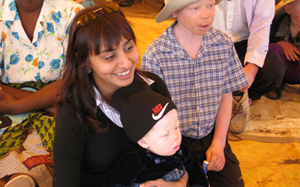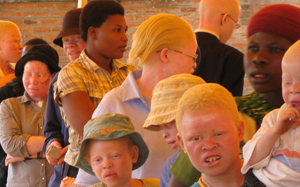More than skin deep
Dermatologist’s program in Malawi helps treat albinos and enlighten people about the nature of the condition
By Jeremy Manier
Photography by Dorothy Shope and Swapna Reddy
 Dermatologist Aisha Sethi’s program treats Malawi’s albinos and teaches residents that people with the condition should not be treated as pariahs.
Dermatologist Aisha Sethi’s program treats Malawi’s albinos and teaches residents that people with the condition should not be treated as pariahs. Albinos in Malawi contend with constant risks of skin cancer from the intense African sun, but among the greatest dangers are the local myths surrounding their condition. Some people believe that weaving an albino’s hair into a fishnet increases the chances of a good catch. Others claim that an albino’s mother must have slept with a white man. Another cruel teaching holds that spitting on an albino is the only way to guard against the condition in one’s family.
Aisha Sethi, an assistant professor of dermatology in the Pritzker School of Medicine, works to educate Malawians about albinism and improve medical treatment of the condition. Along with such education, she has tried to eradicate the superstitions that have led to horrific consequences for some people who suffer from it. Last year the New York Times detailed a string of 19 albino murders in neighboring Tanzania, where some witch doctors have used the victims’ body parts in potions for their supposed magical powers.
That’s the kind of tragedy Sethi and her colleagues hope to prevent through a program she began two years ago. It’s uncharted territory in a nation with no dermatologists, but Sethi hopes their work will be a model for other African nations where albinos have nowhere to turn.
“When I was planning [to study tropical diseases], I couldn’t find a mentor because no one was working on this problem,” says Sethi, who studied global health issues while a resident at the Yale School of Medicine. “If we can get enough data in Malawi, we can convince other governments this problem needs attention.”
The rate of albinism in some southern African tribes climbs as high as 1 in 1,500 births—far above the worldwide rate of 1 in 20,000. One theory is that the condition has persisted because of inbreeding among small tribal groups. Without dark skin to protect them from the sun’s ultraviolet radiation, African albinos face a progressive risk for skin cancer, and often do not live past 40.
In 2007 Sethi started the first dedicated albinism clinic in Malawi’s capital city, Lilongwe, as part of a broader effort to improve dermatological care in the country. The initiative provides albinos with sunscreen and other supplies, raises awareness of the condition, and offers screening for skin cancer.
Born in the United States and educated in Pakistan, Sethi pursued dermatology because many tropical diseases such as hemorrhagic fever are diagnosed through their effects on the skin. Her interest in Malawi emerged during a trip to a medical-training center in Tanzania, where she learned of the region’s need for dermatologists.
 In some southern African tribes, the rate of albinism reaches 1 in 1,500 births, putting many children at risk for skin cancer.
In some southern African tribes, the rate of albinism reaches 1 in 1,500 births, putting many children at risk for skin cancer.The project shows how dermatology can be a vital tool in tropical medicine, says Christopher Shea, chief of the Medical Center’s dermatology section, who helped Sethi get departmental funding for her work. “Skin disease doesn’t often end life, but it can make life unbearable,” Shea adds. “Many of these conditions are relatively easy to treat; you don’t need high-tech tools.” Remedies are deceptively simple—sunscreen, long-sleeved clothing, and wide-brimmed hats. Yet those items are elusive in a region with scarce resources. “These children need sunscreen every single day,” Sethi says.
The albino clinic is just one part of Sethi’s outreach in Malawi, where she spends a month each year. The Chicago team is developing a pipeline of resources to help local medical officers such as Jimmy Malanda, who works with Sethi at his skin clinic in Lilongwe. The group arranged for nearby hotels to collect unused sunscreen from tourists, and coordinated with Raising Malawi, a charity founded by the pop star Madonna, to obtain reduced costs to ship supplies, including sunscreen and surgical tools from the United States.
Even without an organized fund-raising effort, the team is making a difference, Malanda says. During last year’s trip Sethi trained him in electrodessication, a method to remove small or superficial skin cancers. “We used to see albinos in our clinic, but we couldn’t do much with them,” he says. “Now we are taking proper care of our albino patients.”
For the past three years Sethi has organized an annual Albino Awareness Day in Malawi aimed at educating the public, attacking the stigma, and providing screening for skin conditions. Last September she brought Dorothy Shope, AB’07, an education coordinator in the Medical Center’s dermatology section, who realized the team could help patients by providing inexpensive magnifying glasses—another simple remedy for the vision problems many albinos have.
With more than 150 patients on their albino registry so far, the team hopes to learn which parts of the country have the greatest needs and to gauge the success of their skin-care interventions. Beyond medical benefits, the project is teaching local albinos that they can live full lives, Malanda says, and finally emerge from the shadows.
“We tell them, ‘You are not different from us,’” he says. “‘The only difference is that your skin cannot withstand the sun. Otherwise we are the same.’”
Return to top